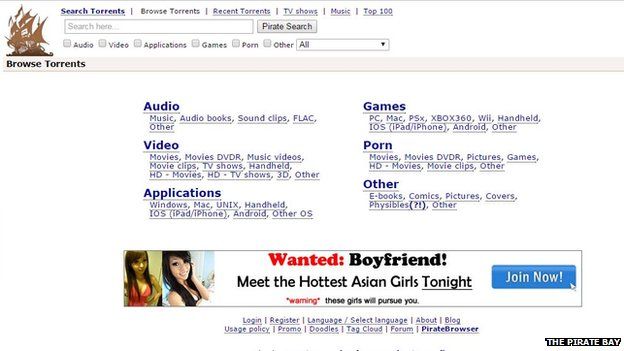Police stop UK ad campaigns appearing on piracy sites
- Published

An anti-piracy police squad suggests it has caused a steep fall in the number of "big name" ads appearing on copyright-infringing sites.
The force says its effort has "almost entirely" stopped UK campaigns by the car, food/drink and property sectors being placed on the illegal web pages.
The scheme involves a blacklist, which is shared with ad brokers whose software determines what ads go where.
But one expert said the effect on the sites' earnings might be "negligible".
Operation Creative was launched by the City of London Police's Intellectual Property Crime Unit (Pipcu) in the summer of 2013.
It led to the creation of the Infringing Website List (IWL) - a database of online services that the police have confirmed provide access to unauthorised content.
Hundreds of sites now appear on the list, which has not been made public. Owners are given a chance to remove illegal material before their platforms are included.
Cheaper ads
Two years on, Pipcu says there has been a 73% drop in advertising from the UK's "top ad spending companies" on the affected sites, which it suggests both reduces their income and removes their "look of legitimacy".
The figure is based on research carried out by Whitebullet - a firm that provides online intellectual property services.
It surveyed the ads placed on 17 sites that offer unauthorised access to TV shows, movies, music and games - both over a 12-week period between June and September 2013 and again between March and June 2015.
The firm's chief executive explained that ads are typically targeted at a local audience - so, a UK-based web user will normally see ads funded by a British campaign, even if the site in question is based elsewhere.
"The effort in the UK means that the advertising profile changes considerably," Peter Szyszko told the BBC.
"You start getting less and less high value advertising - big brands, household name - and you start moving towards either no advertising or different formats of advertising that tend to pay less or are less credible from a consumer perspective - adult sites or sites advertising 'free games' that ultimately contain malware, are fraudulent or are generally just inappropriate."
Mr Szyszko acknowledged, however, that some big-name ads were still getting through.
Brokers used by the leading media buying agencies are supposed to filter the sites they direct ads to, in order to screen out those on the blacklist.
But Mr Szyszko explained that sometimes brokers sub-contracted the work out to other third-parties who were less diligent, meaning the process was not foolproof.
"Holes can appear, and that's why you can still get the premium advertising appearing," he said.
'Underlying problem'
One expert had mixed feelings about the effort.
"It shows copyright enforcement activities are no longer focused on violating internet user's fundamental and civil rights by monitoring all internet traffic, censorship, and shady political deals, as was the case just a few years ago," said Bendert Zevenbergen from the Oxford Internet Institute.
"However, if a few [advertising] sectors do indeed pull out, others will automatically take their place, and the effect on the website's income may be negligible.
"The strategy also does not tackle the underlying problem.
"Internet users demand ubiquitous access to quality content - for which they would gladly pay - so the creative industries would do better to focus their efforts on making their catalogues available on innovative internet-based distribution channels, like Spotify and Netflix, or invest in creating new user friendly services online."
- Published18 July 2015
- Published19 February 2015
- Published23 January 2015